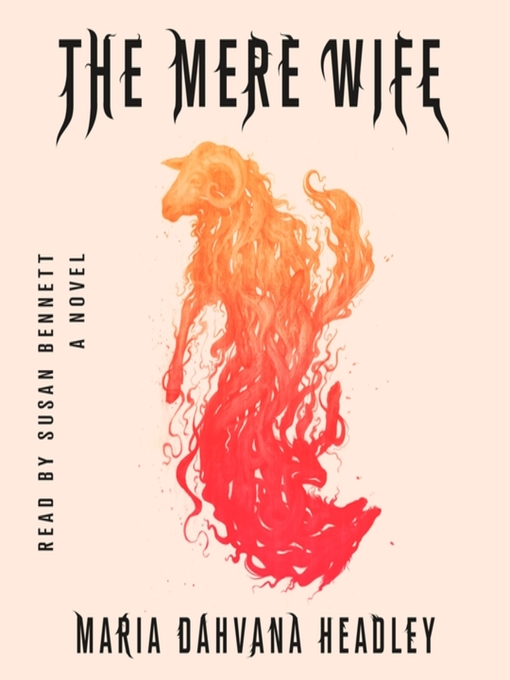How Place Becomes Character in Beowulf Retelling The Mere Wife
We take a closer look at how this modern retelling of epic poem Beowulf gets creative with point-of-view.
The Mere Wife by Maria Dahvana Headley does what the best genre stories can: illustrates the real world in a new way through fantastical elements.
A retelling of Beowulf, the new novel from Susan Bennett combines evocations of monsters and myths with the contemporary story of the clash between two suburban mothers—one an affluent housewife, the other a war-haunted veteran. But it is The Mere Wife‘s use of the collective point-of-view—in particular, a group of five women serving as both a classic Greek chorus in addition to characters in their own right, as well as the perspectives of an ancient mountain—that is the novel’s most unique and powerful element.
I was initially skeptical thatThe Mere Wifewould suit my usual genre-heavy reading tastes. As it turns out, its lyrical wording, deeply felt anger, and emotionally rich characters makes it one of my favorite literary novels. I’m also happy to point out the fanastical elements below. It’s a book about monsters that aren’t quite monsters and people who become monsters and people trying to escape monstrousness, a conversation about modern society as well as about Beowulf.
Beowulfas a text is fertile ground for reinterpretation and changes in emphasis. Author John Gardner mined it in 1971 for his novel Grendel, which painted the titular monster as violent and philosophical. Beowulfin its original form (or at least, the form considered standard) is an epic poem in which the monster known as Grendel terrorizes Heorot, the great hall of a Scandanavian king. The hero Beowulf slays Gredel. Similarly he kills Grendel’s mother, after a battle in a cavern under a lake. Lastly, Beowulf returns in triumph to his homeland, where he also slays a dragon.
Read The Mere Wife by Maria Dahvana Headley
From this framework, Headley added musics on what monstrousness and humanity means today. She also emphasizes the importance of characters’ placement in their world. “I want the world to talk,” Headley said, speaking at the Brooklyn Book Festival in September. She said that she was interested in the ways in which characters interact with the natural world, and so used the mountain’s point of view to directly show those interactions.

The mountain which contains the titular mere also emphasize one of the many injustices the book deals with. Dana Mills, the soldier who returned home from Afghanistan with a baby from a father she can’t remember, used to live on land now occupied by a luxury gated community called Herot Hall.
Dana Mills takes the part of Grendel’s mother. Her son’s name is Gren, and the degree to which he resembles the monstrous Grendel is one of the many careful ways the book plays with the original story. Their enemies in Heorot Hall are recast as ambitious, ferocious society wife Willa Herot, our other main mother character, and police officer Ben Woolf.
Using the mountain’s perspective brings poetic beauty to the text. It also gives the prose some unique capabilities that the human characters’ singular and collective perspectives could not do. It emphasizes the importance of narrative to the story, adds depth and resonance, and creates distance between the reader and the characters in key moments.
For genre readers, it adds an element of magical realism. Whether or not the perspective is a literal creature or creatures isn’t part of the novel’s purview, but it does read like the voice of another monster or set of monsters. If the land is a monster, it is one that has been abused, its body trod over and changed beyond its will. The themes of injustice enacted upon the people in the book are present in the land’s perspective as well. The mountain remembers the people who once lived there, and the glory of their constructions.
“Earth’s a thieved place,” it says. “Everything living needs somewhere to be.”
The mountain has a bias, one that is connected to Dana Mills’ story. Dana’s PTSD-rattled experience moves in and out of her connection to the land. “There isn’t enough earth for everyone … Parts of the world are secret and parts are sour. Parts are drenched and parts are dust—” She grew up on this land, which has since been built over to make the gated community. The horror of this theft is felt upon Dana, who now lives in the abandoned tunnels, and also upon the land itself. Its relationship to the suburb is antagonistic: Willa thinks of it as a haunted place, full of wild animals.
This perspective also adds distance. During a scene in which Ben Woolf attacks Gren and his mother, the perspective of the mere puts space between the reader and the horror of the situation. Were the reader in Ben’s perspective, it could become an action scene. Were the reader in Gran’s perspective, it could become a slasher movie. As neither, the mythic aspect is preserved. Ben Wolf remains frightening: “…we feel the man’s memories of violence, places he’s been in the past, bodies he’s buried, sand he’s scraped over secrets.” … But this horror is not immediate. The mountain contextualizes and mythologizes it.
One of the themes explicitly called out later on is the question of how a hero or a monster is defined. “Their world isn’t large enough for monsters and heroes at once. There’s too much danger of confusion between the two categories.” The mere does not define which one Ben is, although its sadness guides the reader to a conclusion. Using the mountain’s perspective here dissuades the reader from thinking of Ben as a hero. He’s an intruder, a murderer, no matter what he thinks his own motivations may be.
The mountain’s perspective has its own unused agency, a sense of potential movement. It increases tension. “We consider a flood. The mountain quivers and material falls from above him, fine dirt hourglassing down over his face.” This sentence increases that potential in many ways. It “considers,” but does not act. As well as the physical threat of movement, the word “hourglassing” gives the impression of a countdown. This sense of potential movement continues as events at the end of the book accelerate.
This perspective also adds depth. Some of that is literal: the mountain is aware of its own caves and pits, of the history of the land. The mere is a natural place, a bastion of animal and human history. The mountain is cluttered with fossils as well as human detritus, including an abandoned train inside a still mostly-furnished station. In a less literal sense, it invites the reader to think about the effect the land has on human bodies and human effort has on the land.
Overall, the mountain’s perspective enhances the hauntedness of the book. Combined with Headley’s poetic and smooth prose, it contributes to making the novel a powerful and effective blend of fantasy and realism.
The Mere Wife is now available to purchase via Amazon or your local independent bookstore. Check out our hubs for more recommended science fiction and fantasy suggestions, or head over to the Den of Geek Book Club to talk speculative fiction!
Megan Crouse writes about Star Wars and pop culture for StarWars.com, Star Wars Insider, and Den of Geek. Read more of her work here. Find her on Twitter @blogfullofwords.
